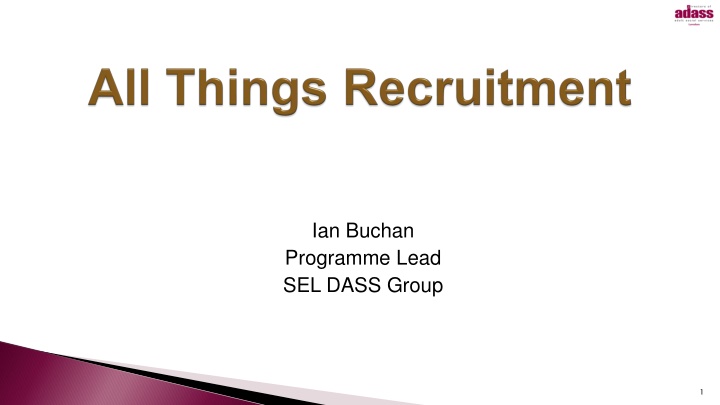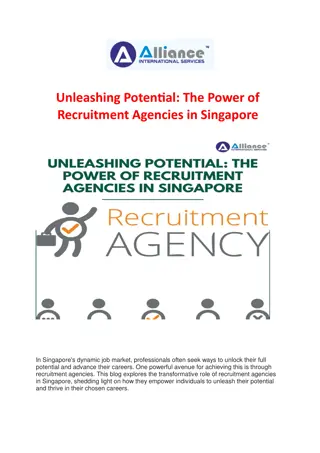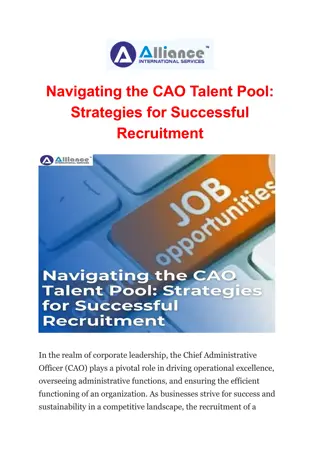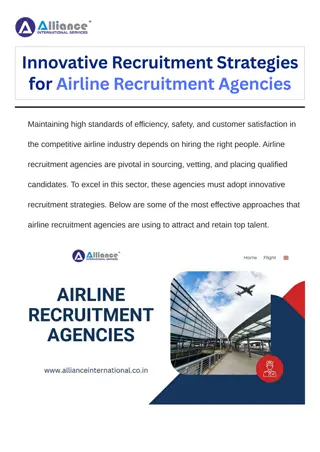
Role of Local Authority in Adult Care Market Shaping and Commissioning
Learn about the critical role of local authorities in shaping and commissioning adult care services. Explore topics such as market management, international recruitment issues, HMRC rules, and sources of support. Discover how these authorities monitor the market, ensure service quality and safety, and address provider failures and interruptions. Gain insights into safeguarding responsibilities and the importance of quality assurance teams in protecting vulnerable adults.
Download Presentation

Please find below an Image/Link to download the presentation.
The content on the website is provided AS IS for your information and personal use only. It may not be sold, licensed, or shared on other websites without obtaining consent from the author. If you encounter any issues during the download, it is possible that the publisher has removed the file from their server.
You are allowed to download the files provided on this website for personal or commercial use, subject to the condition that they are used lawfully. All files are the property of their respective owners.
The content on the website is provided AS IS for your information and personal use only. It may not be sold, licensed, or shared on other websites without obtaining consent from the author.
E N D
Presentation Transcript
Ian Buchan Programme Lead SEL DASS Group 1
The Role of the local authority Market Management QA Key Issues with International Recruitment UKVI Regs HMRC Rules Sources of support 1. 1. 2. 2. 1. 2. 3. 2
Market shaping and commissioning of adult care and support, facilitating the development of services, incl improving quality and workforce. Ensuring there is adequate supply of high-quality services to meet the needs of the locality Promote the efficient and effective operation of the market for adult care and support as a whole understanding the market and the needs of the local population. The above is done via commissioning and setting out the authority s priorities in the Market Position Statement Managing Provider Failure and other service interruptions including contingency planning 3
Their role is to monitor and have an overview of the market, supporting it and ensuring services are of an appropriate quality and are safe for people to use, not just services we commission They should focus on the contractual terms and conditions, the specification- they should check providers have safe and effective systems in place to manage their services, learning from issues (QA Processes) etc. The Safeguarding Adults Board have responsibilities for ensuring people are protected from abuse and therefore QA teams are a key part of how they deliver on this responsibility. QA Teams work in different ways, some using data provided and crossed by visits and others who mainly use office visits to cross check systems and processes that can impact on quality of the service. 4
Supplying staff to a 3rd Party 66% of suspension/ revocations mention this 1. Genuineness of vacancies 40% of suspensions/ revocations mention this . 2. 1. Based on the checks undertaken there was no evidence that the providers had the need for the agreed level of COS issued by the Home Office, in some cases, the provider was a startup or had only ever employed a small number of staff, and no evidence of contracts with local authorities could be found. Salary or pay issues 20% of suspensions and revocations mention this . 3. 1. Providers are achieving the 40 hours of paid work for recruits by giving them work over a long day and not paying them for the gaps in their roster when there is not work available ie being available for 12 hours but only being paid for 6 or 7 hours. Therefore, this contravenes the HMRC rules and the previous working time directives The maintenance of the SMS with up-to-date info and within the timescales required - 20% of suspensions and revocations mention this 4. There are now newer (in the last month or so) terms being used such as Threat to Immigration Control which is mentioned 6 times, and the providers inability to pay the recruits, mentioned 4 times. As well as Misuse of the COS 5. 6
Decide who will manage sponsorship within your business. There are three different roles identified by UKVI, but they can all be fulfilled by the same person. You will need to appoint someone within the organisation to manage the sponsorship process via the Sponsor Management System (SMS) and act as a single point of contact with UKVI. The SMS is UKVI s primary method of communication. It can build in delay if these are not identified early or changed during the process. The roles are: authorising officer a senior and competent person responsible for the actions of staff and representatives who use the SMS key contact your main point of contact with UK Visas and Immigration (UKVI) level 1 user responsible for all day-to-day management of your licence using the SMS. 7
Any repayment clause included in an employment contract must abide by the 4 principles of transparency, proportionate costs, timing and flexibility. The repayment clause must be set out in the contract and job offer letter and explained in full to you before you accept the job. Expense costs must not incur any interest on the amount reclaimed. An employer is responsible for paying some fees as part of the recruitment process. Visa fees are the only mandated fee the IR should have to pay. 8
Typical costs which an IR might incur during the recruitment process include: tuberculosis test (if applicable) 20 to 130 (estimated) dependent on the country the test is taken in language tests (IELTS, OET, SELT) flights 100 to 1000 (estimated) airport transfers 100 (estimated) accommodation per month (initial costs) 500 to 1000 (estimated) A repayment schedule must be provided, and rechargeable costs must taper downwards with time. Employers should apply some flexibility when they consider if they ask you to make the repayment and should consider waiving them in certain circumstances. IR should not be asked to fund the COS/ Immigration skills charge or contribute to your licence cost. 9
Employers must take all reasonable steps to ensure that each worker s average working time (including overtime) does not exceed 48 hours a week. Rest periods and rest breaks Employers are generally required to allow workers the following rest periods and rest breaks: a daily uninterrupted rest period of 11 hours a weekly rest period of 24 hours uninterrupted rest a week or 48 hours a fortnight, at the employer s choice a rest break of 20 minutes when working more than 6 hours a day. Paid Holiday at 5.8 weeks per year (including BH) 10
Travel between jobs/ clients is likely to count as working time for peripatetic/ care workers. This is because during this time, the person is classed as doing work for their employer for example, the employer may change or add tasks. If the gaps between jobs is longer than travel time required due to the employer not having work for the carer, UKVI will also consider this as working time. And raise issues about pay. The gap between jobs/ clients is likely to be linked to the demand the employer is managing not the decision of the carer not to work. 11
Local Government Association Overseas recruitment bite-size guide for social care providers in England | Local Government Association Skills for Care International recruitment (skillsforcare.org.uk) DHSC Code of practice for the international recruitment of health and social care personnel in England - GOV.UK (www.gov.uk) Home Office Skilled Workers List Skilled Worker visa: eligible occupations and codes - GOV.UK (www.gov.uk) Applying for health and social care jobs in the UK from abroad - GOV.UK (www.gov.uk) 12






















